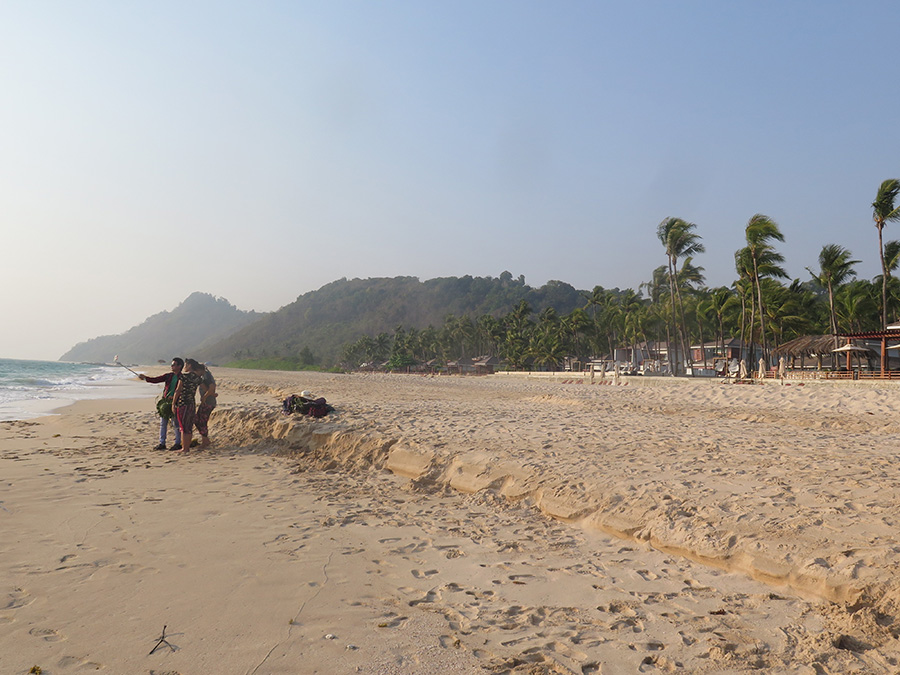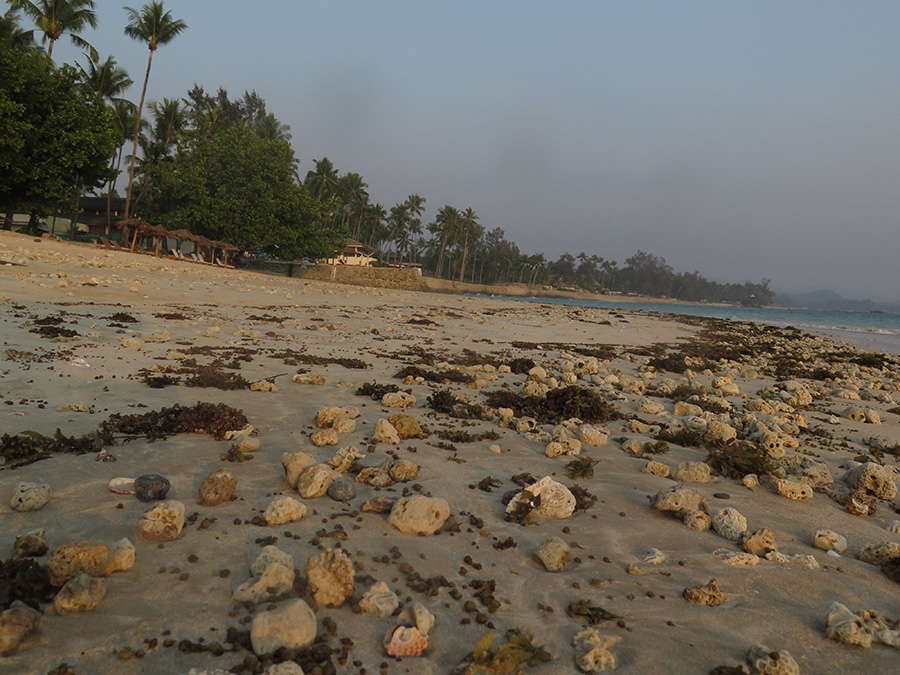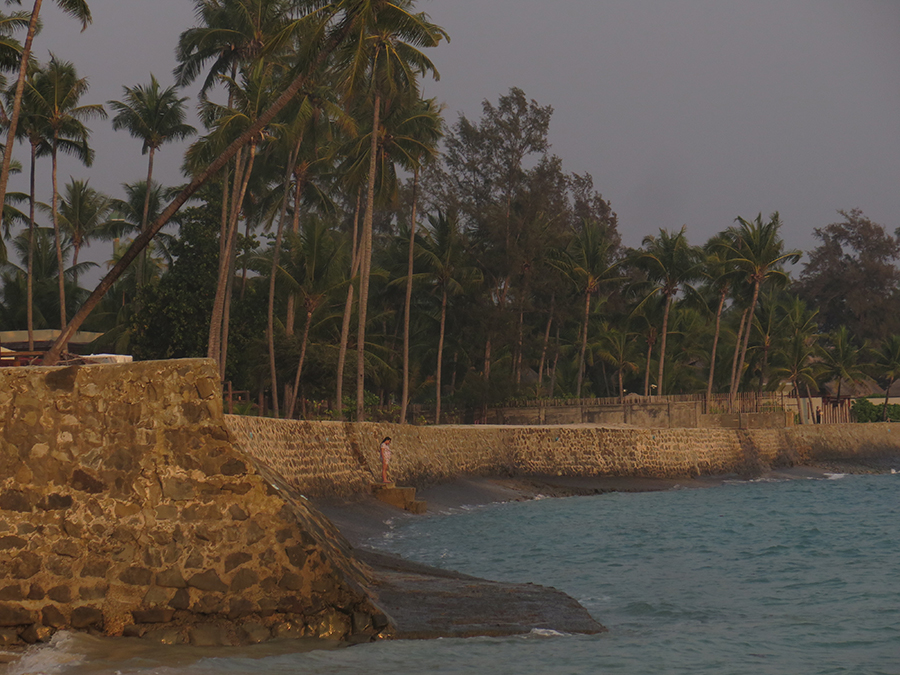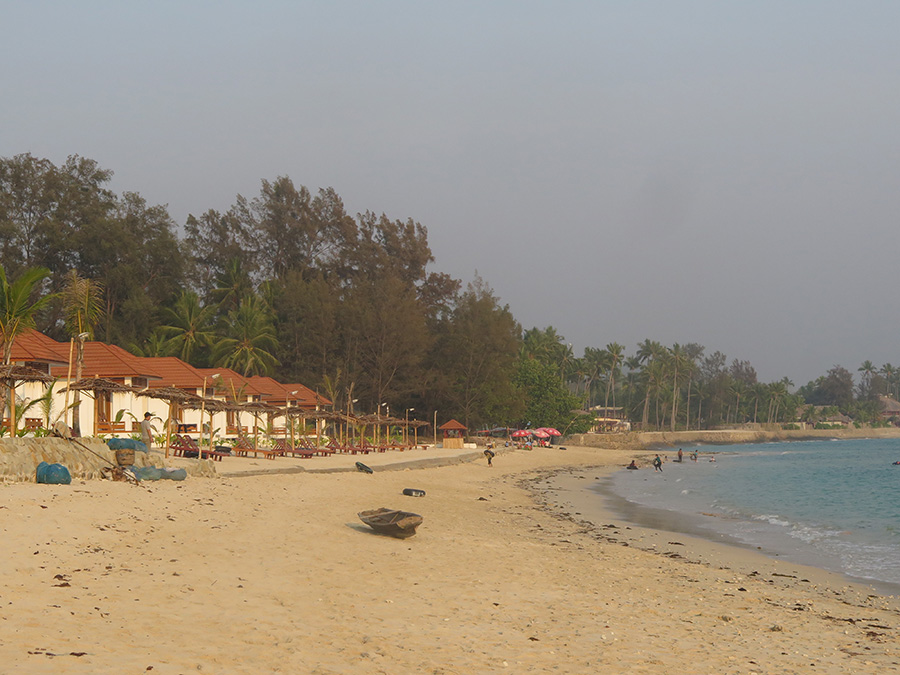NGAPALI, Rakhine State — Daw Khin Myo Nwe, 48, can recall as a child spying the white sand of Ngapali beach, in southern Rakhine State’s Thandwe Township, rolling gently into the turquoise waters of the Bay of Bengal through the row of coconut trees separating the scene from the Mazin-Geiktaw road.
But that scene started to change quickly in late 2010, when developers began building upscale resorts along the beach, erecting brick walls blocking the view from the road and raising retaining walls along the shore to block the rainy-season waves that threatened to damage their properties.
On a recent visit to the beach, The Irrawaddy saw foot-high banks in the sand along the beach in several locations, which some blame on the retaining walls.
“Once, the landscape of the beach was almost like a horizontal floor and even if you went about 30 feet into the water it was about as deeps as your waist. Now, If you walk just four or five steps into the water it almost reaches your chest. I can’t believe my eyes,” said Daw Khin Myo Nwe.
She is not the only one who has noticed the change.
Loi Kham Pang, an ethnic Shan who recently visited Ngapali, said he noticed that the seafloor close to the beach was often uneven with large sandy bumps but smooth much further out.
U Chan Thar, the state’s social welfare minister and a native of Thandwe, was highly critical of the walls the hotels were building along the shore during a sustainable tourism meeting on Sunday in Ngapali joined by union Hotels and Tourism Minister U Ohn Maung and state Chief Minister U Nyi Pu.
He said Ngapali beach was not a rocky place when he was a child but now had many rocks below the surface of the water in several places.
“The retaining walls make the Ngapali shoreline ugly,” U Chan Thar said.
While locals and officials blame the retaining walls for making the incline of the beach increasingly steep, some of the hotel owners blame it on villagers who dig up the beach sand.
“We clearly understand that the impact is huge. This issue must be resolved effectively,” said Myint Myat Thu, managing director of the Jade Marina Resort.

A “Queen” Dethroned
In 2016, holidaymakers voted Ngapali the top destination in Asia in TripAdvisor’s Traveler’s Choice Awards. It was named one of the top 10 beaches in the world and even dubbed a “beauty queen” by some fans.
Since then, however, it has fallen to third among 25 Asian beaches, drawing a variety of complaints. India’s Agonda beach came out on time, followed by the Brocay seashore in Malaysia. Ngapali no longer even makes TripAdvisor’s list of the top 25 beaches in the world.
“Ngapali’s global ranking has declined, which is very upsetting to me. That’s reality; we cannot deny it,” said U Nyi Pu.
It’s not clear how many travelers decided not to vote for Ngapali because of the Rohingya refugee crisis, which saw the military sweep through the state’s northern Maungdaw Township in late 2017 in what the UN has called a “textbook example of ethnic cleansing,” driving nearly 700,000 Rohingya to Bangladesh. Rights activists have called on the UN Security Council to refer Myanmar’s army chief, Senior General Min Aung Hlaing, to the International Criminal Court.
During the weekend meeting in Ngapali, U Nyi Pu said the crisis had greatly impacted the entire nation and that he learned that some diplomats and visitors believed it was affecting the whole state. He said even Japan, Myanmar’s second largest loan provider, has labeled the country a dangerous place to visit.
“In fact it’s happening in a part of northern Rakhine State, not in the entire state. We have repeatedly explained this to them,” he said.
State Planning and Finance Minister U Kyaw Aye Thein listed a litany of other troubles facing Ngapali, from expensive hotel rooms to poor beach maintenance, limited public spaces, an inadequate waste management system, tensions between the hotels and local fishermen, late-night parties, traffic accidents and summertime congestion.
“Dropping from top 10 to 25th place indicates that we are in a very critical situation. We have to tackle [the problem] to not fall further,” he said.
During the meeting, the tourism minister repeatedly urged hoteliers and stakeholders to keep Ngapali pristine and law enforcement authorities to enforce the law. Myanmar Tourism Federation chairman U Yan Win also suggested heavy penalties for lawbreakers.

Well Connected
Some lodge owners complained that little had been done to improve the situation despite several stakeholder meetings over the years emphasizing law enforcement. Some blamed the developers’ powerful connections.
According to the Tourism Ministry’s Thandwe department, 35 local resorts and guesthouses are operating with tourism license. But at least a dozen are not. Documents show that the majority of high-end hotels in Ngapali are linked to relatives of the country’s former military dictators and senior army officers or to tycoons such as Edin U Chit Khine, AGD bank owner U Tay Za, and Fortune International owner U Mya Han. Almost all the resorts have built concrete walls on prime beachfront property.
For example, the new Pristine Mermaid Resort — owned by Nanda Aye, daughter of the previous military regime’s vice chairman, Maung Aye — has been operating illegally without a permit since early this year. Many tons of beach sand were used to fill in much of the six-acre project in Mya Pyin village.
The Irrawaddy found that some villagers and hotels have been stealing the salty, white beach sand for construction. Along the road in Mazin-Geiktaw village, some hotels keep a large pile of the sand out front. Some hoteliers said they relied on the locally sourced beach sand for construction.
“We have to buy from local dealers to get the sand we need,” said U Aung Cho Oo, director of Ngapali Bay, where the union minister for tourism stayed over the weekend.
Thandwe Municipal Committee chairman U Than Tun complained that none of the hoteliers apply to his office for construction permits to build their retaining walls even though the tourism minister officially instructed them to do so last year.
However, nearly all the beachfront hotels have already built retaining walls along the shore. But whenever tourists complain, the chairman said, the businesses simply blame villagers for digging up the beach sand.
“The lack of the rule of law in the region is the main reason why Ngapali beach is being spoiled,” he said.

Unlawful Construction
U Ohn Maung has instructed hoteliers to secure permits from the municipal board before building retaining walls. And though municipal law allows for such walls to be no more than one foot above the sand, some of the walls stretch six feet and up.
“In my opinion, the hotels’ beachfront retaining walls should not exist,” said U Than Tun, pointedly accusing some of the hotels of digging up beach sand themselves.
According to the Tourism Ministry’s guidelines on coastal beach resort areas, construction sites must be 50 meters back from the high-tide mark, avoid building walls or fences that block views of the beach, and not use beach sand.
Hotel Paradise, a public-private venture involving the Civil Aviation Department, appears to have violated all three rules but has secured a tourism license regardless.
Despite the municipal committee chairman’s tough words, however, the weekend meeting on sustainable tourism came to a close without any orders or instructions being issued. The Irrawaddy tried to ask U Ohn Maung about the concerns that were raised, but government employees blocked the reporter’s path.
Local government officials and guesthouse owners told The Irrawaddy it would be “impossible” to get the hotels to tear down their walls.
“Because of power and money,” said Daw Khin Myo Nwe, who owns the Kyaw Ngapali Lodge. “For instance, Pristine Mermaid has very strong backing. They have a brother and sister relationship. So whatever we demand, there is no result.”

A Better Way
In the US, a government report on shoreline stabilization by New York State’s Department of Environmental Conservation says that vertical retaining walls are not recommended to block tides and waves because they can reflect wave energy rather than dissipate it. The report recommends softer stabilization approaches such as placing rocks along the shore to reduce wave velocity.
U Maung Maung Aye, a river morphologist and chief adviser at the Myanmar Environment Institute, said that on a river a retaining wall can, by disrupting the waves, alter the slope of the riverbed over time.
“When the river [bed] becomes steep, the river starts the process of erosion instead of deposition,” he said.
Considering what was happening at Ngapali beach, he said. “I think the retaining walls are one of the causes in this case.”
But he added that it was difficult to tell how much other factors were also playing a part and recommended that geomorphologists and coastal experts collaborate with the nearest university on a research project to find out.

















